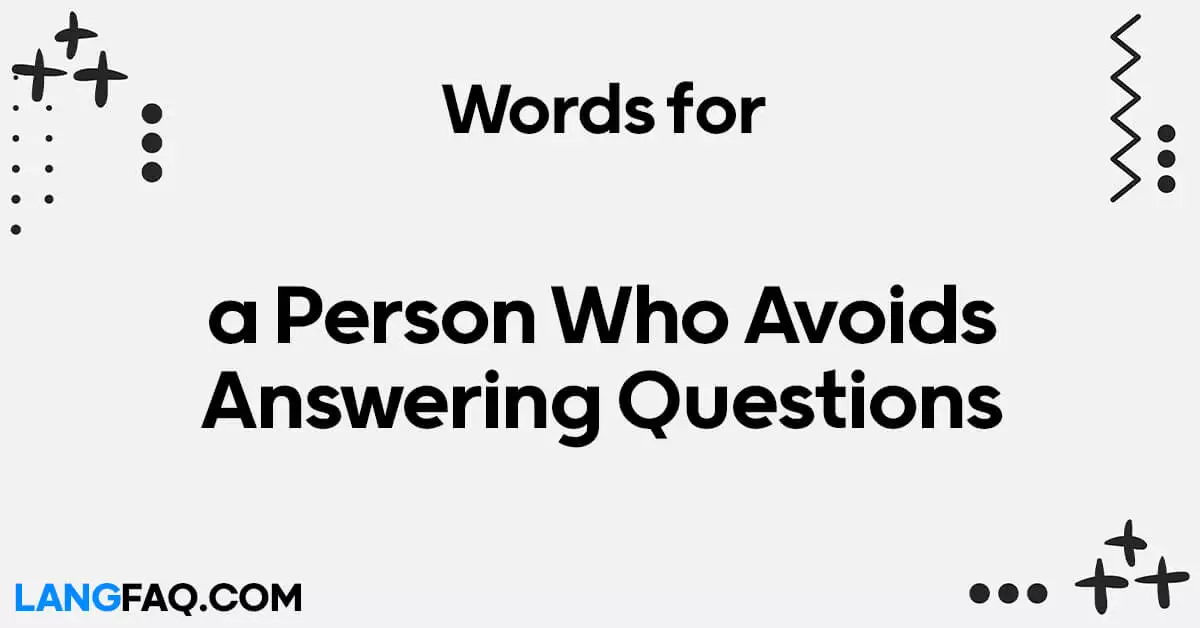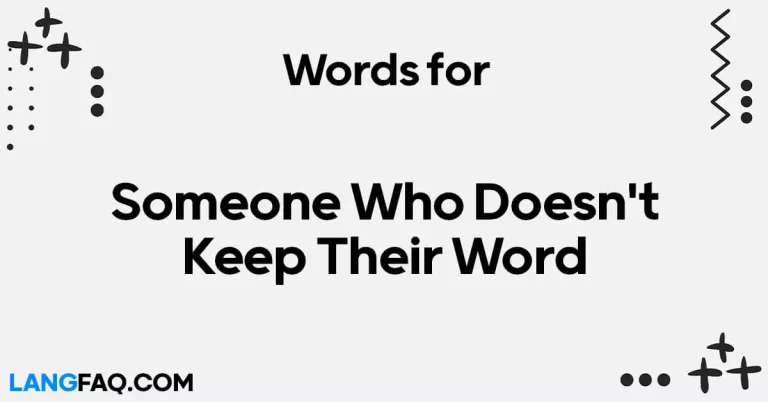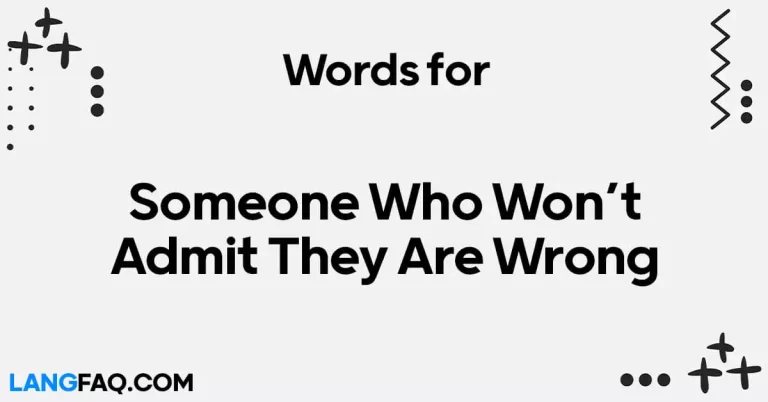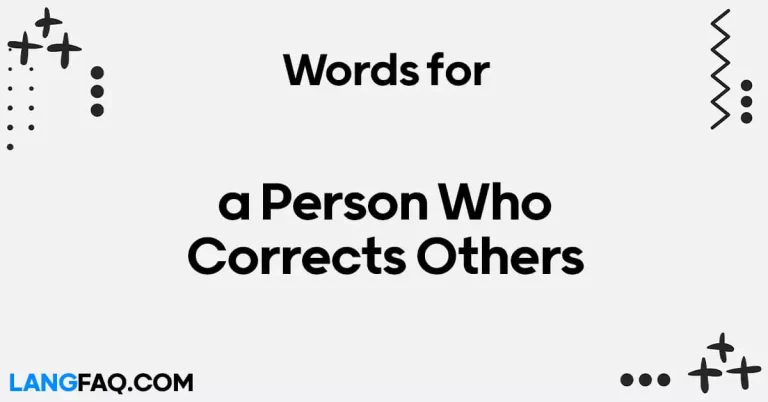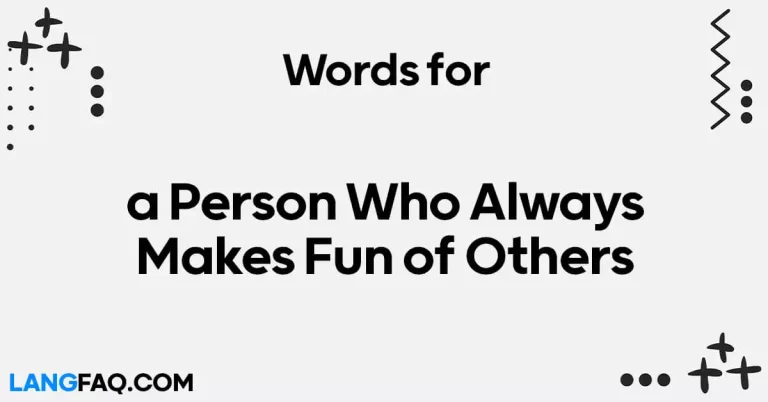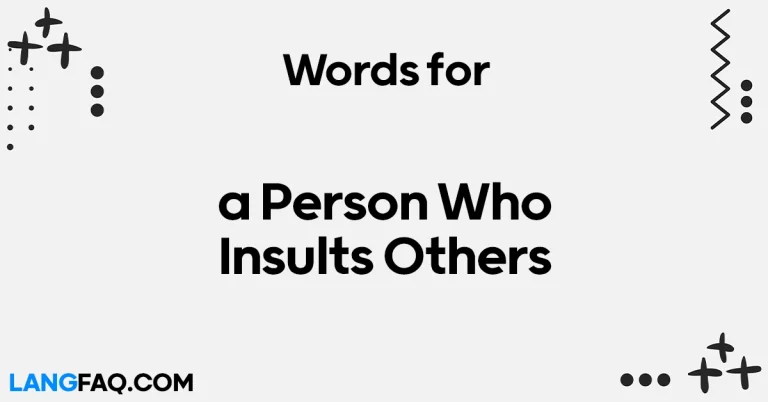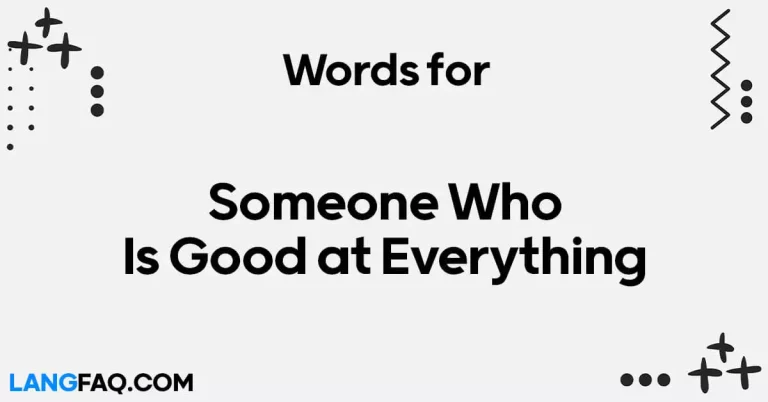When it comes to navigating the intricate web of human interaction, one crucial skill that can significantly impact your ability to communicate effectively is understanding the various ways people avoid answering questions.
Picture this scenario: you’re engaged in a conversation, seeking clarity or information, and you encounter someone who seems to effortlessly sidestep your queries. Frustrating, right?
This is where our journey begins. In this article, we delve into the intriguing world of those who dodge questions, exploring the many facets of “Someone Who Avoids Answering Questions.” Let’s embark on this linguistic expedition to unravel the secrets behind evasion.
The Importance of Identifying Evasion
Before we dive into the realm of synonyms and strategies, let’s take a moment to ponder why it’s vital to recognize individuals who avoid answering questions. You might be wondering, “Why should I bother learning about this?” Well, here’s why:
1. Enhancing Your Communication Skills
Effective communication is the backbone of any successful interaction, whether it’s a job interview, a negotiation, or a simple conversation with a friend. When you can identify evasion, you can navigate conversations with finesse, ensuring that your questions are answered, and your message is conveyed clearly.
2. Identifying Deception
Question evasion isn’t always innocent. In some cases, it can be a telltale sign of deception or an attempt to hide information. By recognizing evasion, you become better equipped to discern when someone may not be forthcoming with the truth.
3. Building Trust
Trust is built on transparency and openness. If you can spot evasion and address it diplomatically, you can foster trust in your relationships. People appreciate honesty, and your ability to navigate these situations can strengthen your connections with others.
Unraveling the Art of Avoidance
Avoiding questions, in its essence, refers to the deliberate act of evading or sidestepping direct inquiries or queries. It’s a linguistic strategy employed by individuals to deflect or dodge questions without providing clear or straightforward answers. This behavior can manifest in several ways, including:
- Deflection: Responding to a question with another question or changing the topic entirely.
- Vagueness: Offering vague or ambiguous responses that don’t address the question’s core.
- Wordiness: Using excessive words or complex language to confuse or distract from the question.
- Evasion Tactics: Employing various tactics such as humor, sarcasm, or even aggression to avoid answering.
- Silence: Simply refusing to respond to a question or maintaining a prolonged silence.
Why is it essential to identify individuals who engage in question evasion?
Here’s where the practical significance of recognizing this behavior comes into play:
1. Ensuring Effective Communication
Communication is a two-way street, and effective communication requires clear and direct exchange of information. When someone avoids answering questions, it disrupts the flow of communication, leaving you with unanswered queries and a sense of frustration. Identifying evasion helps you navigate these situations more effectively, ensuring your questions are addressed.
2. Detecting Deception
In certain situations, evasion can be a red flag for deception. When someone consistently dodges questions, it may indicate that they have something to hide or are not being entirely truthful. By recognizing evasion, you can be more vigilant and discerning in your interactions, protecting yourself from potential deception.
3. Strengthening Relationships
Building trust in personal and professional relationships is crucial. When you can identify and address evasion tactfully, it demonstrates your commitment to open and honest communication. This can foster trust and credibility in your interactions, leading to stronger and more meaningful connections with others.
In essence, identifying individuals who avoid answering questions is a valuable skill that enhances your communication prowess, safeguards against deception, and fosters trust in your relationships.
What Do You Call Someone Who Avoids Answering Questions?
- Evasive Person: An evasive person is someone who consistently employs tactics to avoid providing direct responses to questions. They are skilled at sidestepping inquiries, often using deflection or vague responses.
- Dodger: A dodger is an informal term for someone adept at dodging questions. This term implies that the person is not straightforward and tends to evade inquiries, often to avoid taking responsibility or revealing their true intentions.
- Master of Deflection: This phrase underscores the skill of shifting the conversation away from the original question. A master of deflection can redirect discussions smoothly, making it challenging to obtain a clear answer.
- Obfuscator: An obfuscator specializes in making things unclear or confusing to avoid providing direct answers. They use complexity and ambiguity to cloud the issue, leaving you with more questions than answers.
- Circumlocutor: A circumlocutor is someone who uses excessive words or verbosity to evade questions. They tend to meander around the topic, making it challenging to pin them down to a specific answer.
- Question Avoider: Sometimes, simplicity is key. A question avoider is someone who consistently avoids answering questions directly. They may resort to vague responses or completely change the subject to evade inquiry.
Understanding the Nuances
Each synonym brings its own nuances to the concept of avoiding questions, shedding light on the diverse ways people engage in this behavior. Let’s delve deeper into these nuances:
- Evasive Person: This term is a general descriptor for someone who evades questions. It doesn’t imply a specific method of evasion but highlights the consistent behavior.
- Dodger: The term “dodger” suggests a certain level of sneakiness or avoidance for self-interest. It often implies that the person has something to hide or is reluctant to take responsibility.
- Master of Deflection: A “master of deflection” excels at diverting conversations away from the original topic. They may use humor, charm, or redirection to avoid answering directly.
- Obfuscator: An “obfuscator” intentionally makes things unclear or complex to avoid straightforward answers. This can be a deliberate tactic to maintain ambiguity.
- Circumlocutor: The term “circumlocutor” indicates that the person tends to talk around the subject. They use verbosity and lengthy explanations to avoid addressing the core question.
- Question Avoider: A “question avoider” is someone who simply avoids addressing questions directly. They may use vague responses or change the topic abruptly to evade inquiry.
By understanding these synonyms and their nuances, you’ll be better equipped to identify individuals who avoid answering questions in various forms and contexts. In the next section, we’ll explore common scenarios where you might encounter question evasion in your daily life. Stay tuned for practical insights and strategies to navigate these situations effectively.
A Glimpse into Everyday Scenarios
1. Inquiries About Personal Matters
Scenario: Imagine you’re having a heartfelt conversation with a close friend. You muster the courage to ask them about a personal issue they’ve been facing, hoping to provide support or advice. Instead of a candid response, you receive vague answers, deflections, or a sudden shift in topic.
Explanation: In personal relationships, people may avoid answering questions about sensitive topics such as emotions, past experiences, or personal beliefs. This evasion often stems from a desire to maintain privacy, avoid discomfort, or protect themselves emotionally.
2. Evasion in Politics and Public Discourse
Scenario: It’s election season, and you’re watching a televised debate between two candidates vying for a political office. One candidate consistently sidesteps questions from the moderator and the audience, focusing on delivering rehearsed talking points.
Explanation: In the realm of politics and public discourse, question evasion can be a well-honed art. Politicians often employ tactics like deflecting to different topics, providing vague responses, or resorting to scripted answers to avoid being pinned down on contentious issues.
3. Avoiding Accountability in the Workplace
Scenario: You’re part of a team at work, and a project deadline has passed with significant delays. When you approach a colleague about the issue and inquire about the reasons for the delay, they provide convoluted explanations, blame external factors, and avoid taking personal responsibility.
Explanation: In professional settings, avoiding accountability is a common motive for question evasion. Employees may evade questions about missed deadlines or mistakes to protect their reputation or job security. This can hinder problem-solving and effective teamwork.
4. Navigating Legal Interrogations
Scenario: You find yourself in a courtroom, observing a legal proceeding. The defendant is being questioned by the prosecution, and they frequently respond with “I don’t recall” or provide vague, non-committal answers.
Explanation: In legal contexts, individuals facing questioning during investigations or court proceedings may employ evasion tactics to avoid self-incrimination or protect their legal interests. This can complicate the process of obtaining accurate information.
Real-Life Examples
To illustrate the prevalence of question evasion, let’s take a look at some real-life examples:
Example 1: Political Interviews
In political interviews, it’s not uncommon for politicians to employ evasion tactics. They may pivot to talking points, resort to buzzwords, or answer a different question altogether. This behavior can frustrate interviewers and viewers seeking direct responses.
Example 2: Job Interviews
During job interviews, candidates may use question evasion to gloss over gaps in their employment history or lack of qualifications. They might emphasize unrelated skills or experiences to divert attention from their weaknesses.
Example 3: Relationships
In personal relationships, evasion can occur when one partner avoids discussing sensitive topics like finances, future plans, or past relationships. This can lead to misunderstandings and hinder effective communication.
By recognizing these scenarios and understanding the motivations behind question evasion, you’ll be better prepared to address them effectively. In the upcoming sections of this article, we’ll explore the psychology behind this behavior and offer practical tips on how to handle individuals who avoid answering questions. Stay tuned for more insights to enhance your communication skills.
The Intricate Web of Human Psychology
The psychology behind question evasion
Question evasion, at its core, is closely tied to human psychology and behavior. Several psychological factors contribute to this behavior:
1. Fear of Vulnerability
Explanation: Many people avoid answering certain questions because it makes them feel vulnerable. Sharing personal information or admitting mistakes can be emotionally challenging. Question evasion can serve as a defense mechanism to shield oneself from this vulnerability.
Example: Imagine someone is asked about a past failure at a job interview. They might evade the question to avoid appearing less competent or capable.
2. Protection of Self-Image
Explanation: People often seek to maintain a positive self-image. When faced with questions that may cast them in a negative light, they may resort to evasion as a means of self-preservation. This protects their self-esteem and public image.
Example: In a romantic relationship, one partner might avoid answering questions about their past relationships to prevent jealousy or insecurity.
3. Fear of Consequences
Explanation: Some individuals dodge questions out of fear of potential consequences. This could include legal repercussions, damage to reputation, or jeopardizing relationships. Evasion becomes a way to mitigate these perceived risks.
Example: In a legal setting, a defendant may avoid answering questions to protect themselves from incrimination.
Why some individuals tend to avoid answering questions
Understanding why certain individuals are more prone to question evasion can provide valuable insights:
1. Habitual Evasion
Explanation: For some individuals, question evasion becomes a habitual response developed over time. They may have learned that evading questions helps them avoid uncomfortable situations or confrontations.
Example: A person who grew up in a family where open communication was discouraged may develop a habit of avoiding questions in adulthood.
2. Lack of Communication Skills
Explanation: People who struggle with effective communication may resort to question evasion as a coping mechanism. They may lack the skills to express themselves clearly or fear misinterpretation.
Example: Someone with social anxiety may evade questions in social situations to avoid potential embarrassment or judgment.
3. Defensive Behavior
Explanation: Individuals who tend to be defensive may engage in question evasion as a way to protect themselves from criticism or perceived attacks. This behavior can be a form of self-defense.
Example: A person in a heated argument may avoid answering direct questions to avoid admitting fault.
By delving into the psychology behind question evasion, we can empathize with the motivations that drive this behavior. It’s important to recognize that question evasion often arises from complex emotional and psychological factors. In the next section, we’ll provide practical tips on how to handle situations where you encounter someone who avoids answering questions, allowing you to navigate these conversations with finesse and understanding.
The Disruptive Influence of Question Evasion
Explore how question evasion affects communication
Question evasion isn’t just an inconvenience; it can have far-reaching effects on effective communication:
1. Breakdown in Clarity
Effect: When someone avoids answering questions, it creates confusion and hinders the clarity of the conversation. This breakdown in clarity can result in misunderstandings and misinterpretations.
2. Frustration and Tension
Effect: Constant question evasion can lead to frustration and tension in interactions. It can make you feel like your concerns or inquiries are being dismissed or trivialized.
3. Eroding Trust
Effect: Trust is the foundation of healthy communication. When you encounter question evasion, it can erode trust in the relationship, as it suggests a lack of transparency or honesty.
4. Ineffective Problem-Solving
Effect: Question evasion can thwart effective problem-solving. When questions remain unanswered, issues cannot be addressed, and resolutions cannot be found.
Tips on Handling Question Evasion
Tips on handling individuals who avoid answering questions
Encountering question evasion doesn’t have to be a roadblock in your communication. Here are some practical tips to navigate these situations:
1. Stay Calm and Patient
Tip: When faced with question evasion, maintain your composure and patience. Avoid becoming confrontational or aggressive, as it can escalate the situation.
2. Ask Open-Ended Questions
Tip: Instead of asking yes-or-no questions, use open-ended questions that encourage more detailed responses. This can make it harder for the person to evade without providing relevant information.
3. Active Listening
Tip: Practice active listening by carefully paying attention to their responses. Politely point out when their answers don’t directly address your questions, which can encourage them to be more straightforward.
4. Be Empathetic
Tip: Try to understand the reasons behind their evasion. Are they avoiding the topic due to personal discomfort or fear? Show empathy and create a safe space for them to open up.
5. Use “I” Statements
Tip: Express your feelings and concerns using “I” statements. For example, say, “I feel frustrated when my questions are not answered,” instead of making accusatory statements.
6. Set Boundaries
Tip: If question evasion becomes a recurring issue in a relationship or professional setting, consider setting clear boundaries and expectations for communication.
7. Seek Mediation
Tip: In cases where question evasion is causing significant problems, consider involving a mediator or a neutral third party to facilitate communication and resolution.
8. Reflect on Your Goals
Tip: Before engaging in a conversation, reflect on your communication goals. What do you hope to achieve? This can help you steer the conversation in a productive direction.
Handling question evasion requires finesse and patience. By employing these tips and techniques, you can enhance your communication skills and effectively address situations where someone avoids answering questions. In our concluding section, we’ll introduce you to words and phrases that can bolster your communication toolkit, enabling you to express yourself more clearly and navigate these scenarios with confidence. Stay tuned for valuable vocabulary insights.
Building Blocks of Effective Communication
Words and phrases for clear communication
- Transparency: Transparency refers to being open, honest, and straightforward in your communication. Encourage transparency in your conversations to foster trust and clarity.
- Candidness: Being candid means expressing your thoughts and opinions honestly and without reservation. Encourage candidness to promote open dialogue.
- Directness: Directness involves getting straight to the point without unnecessary detours. Encourage directness in conversations to avoid ambiguity.
- Accountability: Accountability is the willingness to take responsibility for one’s actions and decisions. Promote accountability to ensure that individuals address questions and concerns responsibly.
- Conciseness: Being concise means expressing ideas clearly and succinctly, without unnecessary elaboration. Encourage conciseness to keep discussions focused.
- Clarity: Clarity involves using language that is easy to understand and free from ambiguity. Encourage clarity to prevent misunderstandings.
- Openness: Openness entails being receptive to questions and feedback. Encourage openness to create an environment where questions are welcomed.
Use of these words in conversations
Incorporating these words and concepts into your conversations can transform the way you communicate and interact with others. Here are some tips on how to encourage the use of these words:
- Lead by Example: Be a role model by using these words and principles in your own communication.
- Provide Feedback: Offer constructive feedback to others when they employ these communication strategies effectively.
- Create a Safe Space: Foster an environment where people feel comfortable practicing transparency, candidness, and directness.
- Highlight Benefits: Explain the benefits of clear and direct communication, such as reduced misunderstandings and enhanced trust.
- Emphasize the Value: Stress the importance of accountability, openness, and clarity in building strong relationships and effective teamwork.
By incorporating these words and concepts into your communication style and encouraging others to do the same, you can create a more transparent, honest, and effective communication environment. This not only helps in dealing with “Someone Who Avoids Answering Questions” but also enhances the overall quality of your interactions with others.
Conclusion
In the world of communication, the ability to effectively engage with “Someone Who Avoids Answering Questions” is an invaluable skill. As we wrap up our exploration, let’s recap the key takeaways from this journey and empower you to enhance your vocabulary and communication skills.
Embracing the Art of Communication
Throughout this article, we’ve delved into the intriguing world of question evasion and its impact on communication. Here’s what you should remember:
- Identifying Question Evasion: Recognizing when someone avoids answering questions is the first step in addressing this behavior.
- The Psychology Behind Evasion: Understanding the psychological factors that drive question evasion can help you approach these situations with empathy and effectiveness.
- Common Scenarios: We explored everyday scenarios where question evasion occurs, providing real-life examples to illustrate these scenarios.
- Tips for Handling Evasion: Practical tips were shared to help you navigate conversations with individuals who tend to evade questions, fostering better communication.
- Words for Effective Communication: We introduced you to powerful words and concepts that promote clear, honest, and direct communication.
Empower Your Communication Skills
As you embark on your journey to enhance your vocabulary and communication skills, keep these strategies in mind:
- Practice Active Listening: Truly listening to others can lead to more productive and transparent conversations.
- Lead by Example: Incorporate transparency, candidness, and directness into your own communication style.
- Foster Trust: Encourage an environment of trust and openness where questions and concerns are welcome.
- Embrace Clarity: Prioritize clarity in your communication to minimize misunderstandings.
- Be Patient: When dealing with question evasion, patience and empathy can go a long way in resolving issues.
- Set Boundaries: In professional or personal settings where question evasion persists, consider setting clear boundaries for communication.
- Seek Resolution: Ultimately, the goal of effective communication is to find solutions, build relationships, and foster understanding.
By embracing these principles and continuously refining your communication skills, you’ll be better equipped to navigate the intricacies of human interaction, whether you’re dealing with question evasion or striving for more open and effective conversations.
So, as you continue on your path of self-improvement and communication mastery, remember that each conversation is an opportunity to grow, connect, and make a positive impact. Keep honing your skills, and you’ll find yourself better equipped to engage with the world around you, one conversation at a time.

